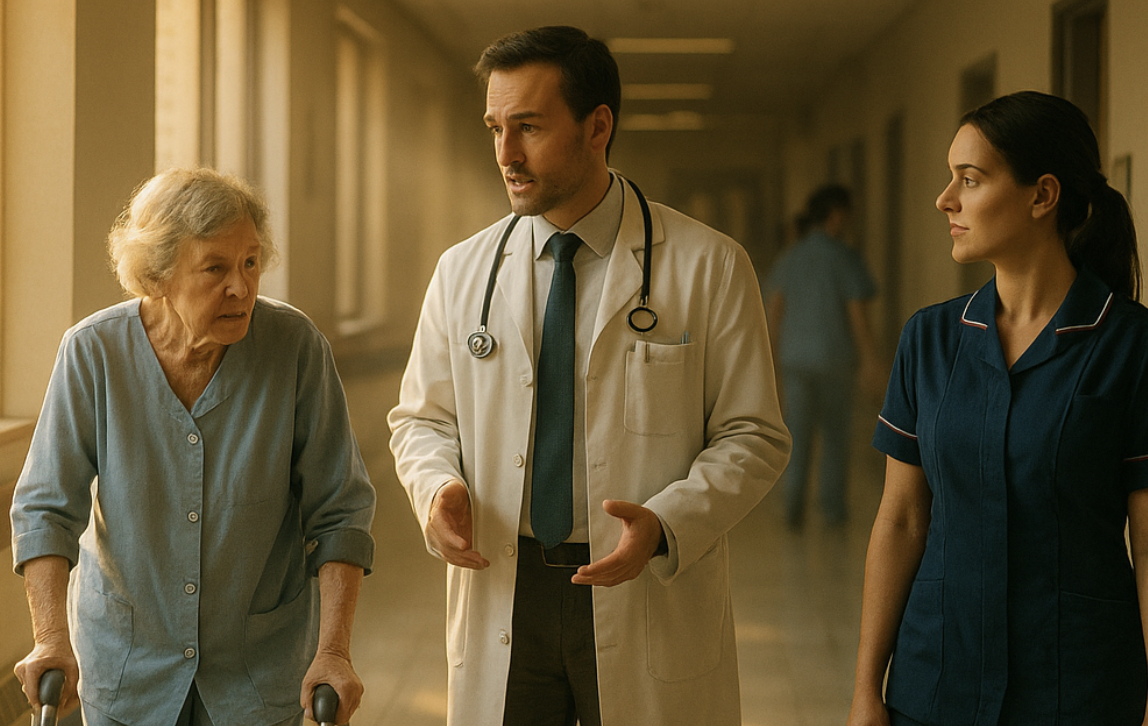I never believed in fate until, one cold night, it knocked on my door with bloody knuckles and stared at me with the empty eyes of a dying God.
Chapter 1. The Night that Tore the Silence
The silence in the on-call room was as thick as anesthesia, and just as pleasantly numbing. Anton Viktorovich, the on-duty surgeon, was sinking into it like into a deep pool, letting the fatigue of the last six-hour operation wash the tension from his muscles. His eyelids grew heavy, his mind drifted into a serene void where there were no cries, no groans, no nagging beeps of machines.
That fragile idyll was ripped apart by a sharp, piercing sound from the admitting area. Not a scream, not a moan—something in between, a squeal that broke into a desperate argument. Anton Viktorovich slowly, reluctantly pushed himself up on one elbow. His body, wrung out to the last cell, protested every movement. He stretched lazily, and a muffled yawn caught in his throat when his gaze fell on the door.
“What’s all the commotion out here?” His voice came out hoarse and dehydrated, but a steel thread of authority already ran through it.
Framed in the doorway, bathed in the flicker of fluorescent light, stood Lyudmila—the nurse with chestnut-brown eyes and a short, almost boyish cut. She fluttered her lashes in fright, as if batting away a swarm of midges, and tried to squeeze out a soothing smile. What came was only a strained grimace that barely hid animal fear. She knew: Anton Viktorovich, the young but already legendary “Maestro of the Scalpel,” had no patience for fuss or unprofessionalism. He was an ascetic in a white coat, a creature whose life was woven into surgical sutures and the pulse of cardiac monitors. Gossip about his personal life was thinner than a desert wind; it seemed he had been born with a scalpel in his hand and knew no reality but the sterile white of the operating room.
“Nothing serious, Anton Viktorovich. Sorry if we disturbed your rest. It’s already been resolved,” she said, her voice trembling and giving the lie away completely.
“It most certainly has not!” came a brisk, adrenaline-fueled, indignant voice. From around the corner, like a whirlwind, a girl in an EMS paramedic uniform swept in. Strands of hair the color of ripe wheat had slipped out from under her cap, and her eyes burned with a cold blue flame. “We won’t make it anywhere else in time! He’ll die if you refuse to take him! You have no right! We’re counting in seconds here, and you’re dragging it out as if this were defective merchandise instead of a human being! You can’t do that!”
Lyudmila shot the impudent paramedic such a look that the air itself seemed to crackle with static. Her eyes blazed with the furious urge to saw the cheeky girl in half like a surgical thread. But the girl stood her ground, chin lifted, gaze unwavering.
Anton Viktorovich frowned. Fatigue receded at once, yielding to professional curiosity and a sharp pang of anxiety.
“What patient? What’s the uproar about?” His questions came honed like a blade, steel needles of sound.
“He’s not salvageable,” Lyudmila whispered, dropping her eyes. “He… he’s one of them. A homeless man. Filthy. There’s nothing we can do—only waste your strength and time. You just finished an extremely complex operation, you haven’t rested, your hands…”
Anton twisted his lips into something like a smile. This patronizing concern annoyed him. Since when had anyone but he decided what his hands were capable of? These hands that in the last five years had brought hundreds back to life, that had felt the beating heart of life itself under their fingers.
“Since when, Lyudmila, have you taken it upon yourself to decide who is a ‘lost cause’ and who isn’t?” he said quietly, with an icy clarity that made the nurse physically shrink as if struck by a whip.
“I… I only meant well… Thought you should save your strength for those we truly can save…”
He shook his head, a shadow of disappointment flitting through his eyes. He believed in statistics, in diagnoses, in the dispassionate data of machines. But he also believed, sacredly, that until the last heartbeat, the last breath, there is a chance. And that chance must not be taken away. Ever.
The paramedic—her name, as it turned out, was Ariadna—barely kept from letting out a triumphant breath of relief. She hurried him, almost at a run, toward the open doors of the admitting area, to the ambulance from which came ragged, rattling sounds. On the way, she blurted out: the man had a massive heart attack, he was unconscious, the crew had done everything possible—defibrillation, oxygen, drugs—but he needed immediate intervention, open-heart surgery, a bypass, only a miracle… She understood that she herself was powerless, and that helplessness burned her from within. How she longed to have that gift—the gift of wielding the scalpel, of working miracles at the boundary between life and death. Maybe then, years ago, she shouldn’t have been afraid and should have applied to medical school. Then she would never have let anyone call a person “hopeless,” tossing him to a cruel fate.
Chapter 2. A Face Out of Oblivion
Anton Viktorovich stepped into the exam room. The air was dense and heavy, smelling of sweat, dirt, disinfectant, and the sweet, sickly odor of death drawing close. His gaze slid over the body on the gurney—gaunt, filthy, dressed in rags soaked with city grime. And froze.
Time stumbled, slowed, and then stopped altogether.
His fingers—always so firm and sure—curled involuntarily into helpless fists. The blood drained from his face, leaving his cheeks deathly pale. He stared at the patient’s face. Stubbled, smudged, sunken-cheeked, with bruised shadows under the eyes. But the features… those features were seared into his memory like fire.
“They’re always carting in this skid row,” came a strangled whisper behind him. Lyudmila was murmuring to another nurse. “Filthy, lice-ridden, and they still have demands. Watch, now—Anton Viktorovich will take one look at this stinking old relic and send them packing. We don’t need a petri dish of infection in here.”
The words—sharp and poisonous as porcupine quills—stabbed into his consciousness. They spoke of a human being as if he were a thing. Of life as something to be tossed in the dumpster when no longer needed. Something in him cracked. A hot wave of rage surged to his throat, and it took inhuman effort not to grab them by the collars and throw them out.
“Prep an operating room. Now.” His own voice sounded foreign—low and metallic, as if rising from underground.
“What?” Lyudmila’s eyes flew open; her face twisted into a mask of genuine astonishment. “Anton Viktorovich, just look at him! He—”
“Was I unclear?” He turned to her, and his gaze—usually focused and calm—now burned with such a cold fire that the nurse’s breath caught. “NOW.”
He ordered the patient transferred to the operating room at once and hurried to his office. He needed a minute. Just one minute to take a swallow of ice-cold coffee that would scorch his throat and to gather his unraveling thoughts into a fist. There was no time. He was on the brink of physical collapse. But he wasn’t going to retreat. Because anyone could end up on that table under the bright lights. And if there is even a single, ghostly chance—you don’t let it slip away. Never.
The operation lasted an eternity. The clock on the wall seemed frozen. Anton worked with automatic, almost machine-like precision. His fatigue dissolved in adrenaline and fanatic concentration. His hands—those instruments of the highest precision—moved on their own, guided by an unseen force that knew every vessel, every nerve, every muscle fiber. He fought. Fought for every heartbeat, for every scrap of living, breathing flesh.
When the last stitch was tied, and he finally stepped away from the table, satisfied that life—fragile and tenuous, but still life—had been anchored in that battered body, Anton Viktorovich stepped outside. He needed a gulp of frosty night air to feel that he himself was still alive. The stars on the black velvet sky seemed especially bright and close that night.
“Why did he latch onto that old man like that?” came another whisper from around the corner, tailed by the acrid reek of cigarette smoke. “Never seen him so… possessed.”
He didn’t react. Let them whisper. Let them speculate. He knew a simple truth: if a person is in the wrong place, sooner or later life will set the pieces where they belong.
Chapter 3. The Echo of a Past Rescue
The next day, Anton came to the hospital not as a surgeon in a white coat, but as a simple man in civilian clothes. He walked the long corridors he knew down to the last crack in the tiles with one desire—to see Him. Mikhail Semyonovich. The very man who, once, at the darkest hour of his life, had reached out a hand and kept him from falling into the abyss.
The patient hadn’t fully regained consciousness yet. He was kept in intensive care under observation. A body, worn down by sickness and privation, was slowly mending.
“Word is your patient caused quite a stir yesterday,” said Anton’s colleague, Artyom the anesthesiologist, leaning against the door jamb. “The nurses are buzzing that it’s the first time they’ve seen you so… fierce. They say you looked like an archangel with a flaming sword guarding the gates of paradise—for some bum.”
“Anyone who measures the worth of a human life by the cleanliness of his clothes has no place in medicine,” Anton replied evenly. “Even if there was a small, private share of the personal in what I did, I would have done the same for anyone in need. I saw a chance. I took it. Who am I to refuse a chance to give someone one more day, one more breath?”
“A personal share?” Artyom raised an eyebrow.
Anton smiled, and his smile held a bottomless, age-old sorrow. He remembered. That day. That terrible, black day when he, a young, overconfident surgeon, lost his first patient. A little girl. Seven years old. A car crash. He fought for her for hours, but her small heart couldn’t hold out. He came out of the OR, peeled off his bloody gloves, and felt the world crumble. He was ready to quit everything—career, dreams, all of it.
Blind drunk by nightfall, he wandered the city, flaying himself for his powerlessness, cursing the imperfection of medicine and the cruelty of the universe. He was mugged—his wallet and phone stolen—but at the moment he was ready to collapse onto the asphalt, a solid, steady man in an EMS uniform caught him. That was Mikhail Semyonovich. He didn’t lecture. He simply walked the young doctor to his rig, drove him home, shoved him through his door and, standing on the threshold, said words Anton carried through all the years:
“You can’t save everyone, son. You have to accept that. Sometimes the matter of life and death is decided up there, and our hands, alas, are only instruments—not the hands of the Creator. But… as long as you have the strength to lift those hands—don’t lower them. As long as you breathe—don’t stop fighting for someone else’s breaths. Sometimes one saved heart sets off a chain reaction of hope in this cold world.”
Those words, like a tuning fork, brought his thrown-off life back into pitch. They returned him to the profession. And now, fifteen years later, fate—ironic and unpredictable—had come to settle the account. It had cast at his feet the very man who had once saved him.
Chapter 4. Bitter Truth and Quiet Kindness
When Mikhail Semyonovich came to and grew strong enough to speak, he told his story. Slowly, with long pauses, his voice hoarse like an autumn wind. After his wife’s death, his only son, taking advantage of his grief-stricken state, convinced him to sign the apartment over. And then, on a cold winter evening, simply threw him out, saying, “People like you don’t belong among normal folks.” The old man wandered for days, sleeping in stairwells and at stations, until his worn, grief-broken heart failed him.
Anton listened, and a black, merciless fury boiled inside him. He clenched his fists until the knuckles went white. That very day he found the son’s address and went there. The door opened on an oak-paneled, expensive apartment. A well-groomed man in his forties, smelling of costly cologne, gave a contemptuous smirk.
“His things? Papers?” he snorted. “I don’t have a father. And that derelict you picked up is a stranger to me. I don’t recommend sticking your nose into other people’s business, doctor.”
Anton didn’t argue. He simply looked at him—with that piercing surgeon’s gaze that sees through you—and turned away. He understood that some diseases can’t be cut out with a scalpel. He helped Mikhail Semyonovich retrieve what documents remained, arranged for him to enter a good private care home for the elderly—bright, clean rooms, a well-kept garden. He promised to pay for it.
At first the old man resisted desperately.
“Son, I can’t… I don’t want to be a burden. You’ve already done more for me than anyone…”
“Mikhail Semyonovich,” Anton said softly, taking his gaunt, blue-veined hand in his own. “Once you told me that a single saved heart can change everything. Let me be the one to start that chain reaction for you now.”
And the old man, looking into his honest, weary eyes, yielded. He accepted help. From the very fellow he had once kept from giving up in the pitch-black night.
Chapter 5. Ripples on Water
From then on, Anton visited Mikhail Semyonovich regularly. Those meetings were a breath of fresh, clean air for him, a refuge from the world of endless surgeries and stress. They talked about life, about medicine, about the eternal. The old man turned out to be a treasure trove of wisdom and striking—often tragic—stories from his long years on the ambulance.
One day, as Anton came into the care home, he saw a familiar figure by the window in Mikhail Semyonovich’s room. It was Ariadna, the same fearless paramedic. After Anton told her where their “shared” patient now lived, she began visiting too. She had no living grandparents, and Mikhail Semyonovich, with his calm wisdom and kind eyes, became kin to her in spirit.
The three of them would sit over tea, listen to his stories, ask his advice in difficult cases at work. And he, for his part, looked at them and saw in their bright eyes, in their devotion to the calling, those who would carry his baton forward. Those who would save lives without looking at social status, the cleanliness of clothes, or the thickness of a wallet.
Anton and Ariadna grew close. They were bound not only by their work, but by something more—a shared coordinate system in which mercy and duty stood above convenience and profit. They were united by a fierce, almost physical rejection of indifference. One day, walking through an autumn park strewn with gold leaves, Anton took her hand and realized he never wanted to let it go. Ever.
They decided to marry. It was a quiet, heartfelt decision—no pomp, but absolute certainty.
Their wedding was modest. The most important toast was given by Mikhail Semyonovich. Sitting in the front row in a newly pressed suit, he watched them with silent, shining tears rolling down his wrinkled cheeks. His trembling hand raised a glass.
“To you, my dears,” he said, and his voice was steady and clear. “May your hands never know weariness, and your hearts—doubt. Save them. Save everyone you can.”
The lovers, hand in hand, promised him they would. They swore never to forget his counsel. They would fight for every life brought to them. Because every person, without exception, deserves a second chance—even if the rest of the world has already pronounced a merciless verdict.


